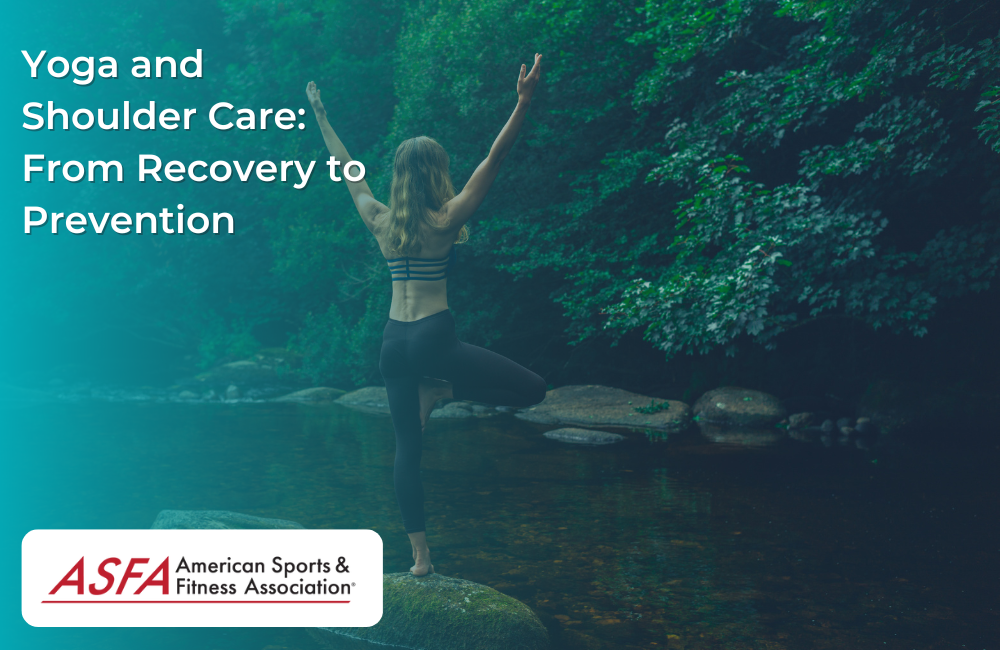
Yoga and Shoulder Care: From Recovery to Prevention
Shoulder health is an essential aspect of overall physical well-being, especially in our increasingly desk-bound and digitally-driven lifestyles. Yoga, renowned for its holistic approach to health and wellness, offers a comprehensive toolkit for shoulder care. This detailed exploration looks at how yoga can aid in the recovery from shoulder injuries and contribute to the prevention of future issues for everyone, from yoga novices to seasoned practitioners.
Understanding the Shoulder Joint
The shoulder, a ball-and-socket joint, is known for its wide range of motion. This flexibility, while advantageous, also renders the shoulder susceptible to various injuries and chronic conditions, including rotator cuff tears, frozen shoulder, and arthritis.
Yoga for Shoulder Rehabilitation
Yoga can be an invaluable component in the rehabilitation of shoulder injuries, helping to restore strength, flexibility, and mobility.
Gentle Stretching and Opening:
- Begin with poses like ‘Melting Heart’ (Anahatasana) and ‘Easy Pose with Eagle Arms’ (Sukhasana with Garudasana Arms) to stretch and open the shoulder area gently.
Building Strength Gently:
- Incorporate poses such as ‘Locust Pose’ (Shalabhasana) and ‘Half Frog Pose’ (Ardha Bhekasana) to build strength in the shoulders, arms, and upper back.
Enhancing Mobility:
- Utilize poses like ‘Cow Face Pose’ (Gomukhasana) and ‘King Pigeon Pose’ (Rajakapotasana) to improve the mobility and flexibility of the shoulder joint.
Yoga for Preventing Shoulder Injuries
Regular yoga practice can also play a significant role in preventing shoulder injuries by strengthening and increasing flexibility in the shoulder area.
Strengthening the Surrounding Muscles:
- Engage in poses like ‘Chair Pose’ (Utkatasana) and ‘Warrior I’ (Virabhadrasana I) to build strength in the muscles around the shoulder joint.
Improving Flexibility and Range of Motion:
- Practice poses such as ‘Intense Side Stretch Pose’ (Parsvottanasana) and ‘Reverse Triangle Pose’ (Parivrtta Trikonasana) for greater shoulder flexibility.
Fostering Upper Body Strength:
- Advanced poses like ‘Upward Bow’ (Urdhva Dhanurasana) and ‘Handstand’ (Adho Mukha Vrksasana) can significantly enhance overall upper body and shoulder strength.
Integrating Breath and Mindfulness
Incorporating breathing techniques and mindfulness can enhance the healing and strengthening process of the shoulders.
Breathwork for Relaxation and Healing:
- Practice ‘Bee Breath’ (Bhramari Pranayama) and ‘Cooling Breath’ (Sitali Pranayama) to aid relaxation and reduce inflammation in the shoulder area.
Mindful Movement for Injury Prevention:
- Focusing on the sensations and alignment in each pose helps prevent overexertion and further injury.
Yoga Alignment for Healthy Shoulders
Proper alignment in yoga poses is critical for shoulder health, helping to prevent undue stress and strain.
Mastering Shoulder Alignment:
- Learn proper shoulder alignment in foundational poses like ‘Mountain Pose’ (Tadasana) and ‘Extended Triangle Pose’ (Utthita Trikonasana) to ensure shoulder safety.
Utilizing Props for Safe Practice:
- Use props such as yoga blocks, straps, and bolsters to support and maintain correct alignment, especially in poses that place pressure on the shoulders.
Yoga Tailored for Specific Shoulder Conditions
Tailoring yoga practices to specific shoulder conditions is key for effective recovery and prevention.
Yoga for Rotator Cuff Injuries:
- Focus on gentle stretches and gradual strengthening, avoiding poses that put excessive strain on the rotator cuff.
Yoga for Arthritis in the Shoulder:
- Implement softer, more fluid movements and avoid poses that cause joint pain or discomfort.
Yoga as Complementary Therapy
Consider yoga as a complementary approach to traditional medical treatments for shoulder issues.
Integrating Yoga with Physical Therapy:
- Combine yoga with physical therapy exercises for a holistic recovery process.
Consulting Healthcare Professionals:
- Always consult with healthcare providers before starting a yoga routine, particularly when dealing with shoulder injuries.
Mental Health Benefits of Yoga in Recovery
The mental and emotional benefits of yoga are particularly valuable during the recovery process.
Stress Reduction and Emotional Balance:
- Use meditation and relaxation techniques in yoga to manage stress, which can be both a cause and a result of shoulder pain.
Enhancing Body Awareness for Pain Management:
- Yoga’s focus on body awareness helps individuals recognize and respond appropriately to pain signals, facilitating a more effective recovery.
Building a Consistent Yoga Practice
Developing a regular yoga practice is crucial for both rehabilitation and prevention of shoulder injuries.
Starting with Basics and Progressing Gradually:
- Begin with basic poses, gradually moving to more complex poses as strength and flexibility improve.
Valuing Regular Practice Over Intensity:
- Consistent, moderate practice is more beneficial for shoulder health than infrequent, intense sessions.
Advanced Yoga Practices for Shoulder Health
For those with a strong yoga foundation, advanced practices can provide additional benefits.
Advanced Poses for Strength and Flexibility:
- Challenge yourself with poses like ‘Peacock Pose’ (Mayurasana) and ‘Scorpion Pose’ (Vrischikasana) for enhanced shoulder strength and flexibility.
Inversions for Improved Shoulder Stability:
- Inversions such as ‘Forearm Stand’ (Pincha Mayurasana) can significantly improve shoulder stability and strength.
Yoga for Different Life Stages and Lifestyles
Yoga’s versatility makes it suitable for various life stages and lifestyles.
Yoga for Older Adults:
- Focus on gentle stretches and strength-building exercises tailored for the older population to maintain shoulder mobility and health.
Yoga for Athletes and Active Individuals:
- Incorporate dynamic stretches and strength-building poses to enhance athletic performance and prevent sports-related shoulder injuries.
Yoga for Desk Workers:
- Emphasize poses that counteract the effects of prolonged sitting and computer use, focusing on opening and strengthening the shoulder area.
Yoga offers an effective and holistic approach to maintaining shoulder health, aiding in both the recovery from and prevention of shoulder injuries. Through a combination of gentle stretches, strength-building poses, proper alignment, breath work, and mindfulness, yoga provides a comprehensive pathway to shoulder wellness. Whether as a rehabilitative tool or a preventive measure, yoga’s principles of balance, strength, and flexibility make it an invaluable practice for maintaining healthy shoulders in our daily lives.




